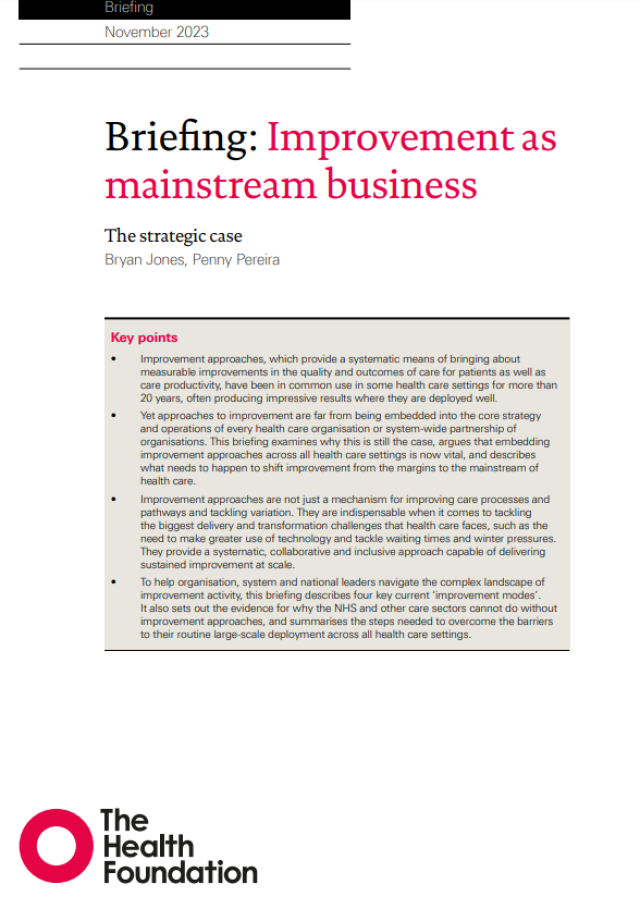Briefing: Improvement as mainstream business The strategic case
November 2023

Key points
- Improvement approaches, which provide a systematic means of bringing about measurable improvements in the quality and outcomes of care for patients as well as care productivity, have been in common use in some health care settings for more than 20 years, often producing impressive results where they are deployed well.
- Yet approaches to improvement are far from being embedded into the core strategy and operations of every health care organisation or system-wide partnership of organisations. This briefing examines why this is still the case, argues that embedding improvement approaches across all health care settings is now vital, and describes what needs to happen to shift improvement from the margins to the mainstream of health care.
- Improvement approaches are not just a mechanism for improving care processes and pathways and tackling variation. They are indispensable when it comes to tackling the biggest delivery and transformation challenges that health care faces, such as the need to make greater use of technology and tackle waiting times and winter pressures. They provide a systematic, collaborative and inclusive approach capable of delivering sustained improvement at scale.
- To help organisation, system and national leaders navigate the complex landscape of improvement activity, this briefing describes four key current ‘improvement modes’. It also sets out the evidence for why the NHS and other care sectors cannot do without improvement approaches, and summarises the steps needed to overcome the barriers to their routine large-scale deployment across all health care settings.
The NHS is now 75 years old. Together with other care sectors it faces an almost unprecedented array of challenges, but extra capital investment and the promised extra staff in key professions alone will not be enough to deliver the breadth and depth of change needed. Alongside the management and operational infrastructure and culture of health care, improvement approaches and methods can help to address the many delivery and transformation challenges health care faces.
Improvement is about giving the people closest to issues affecting care quality the time, permission, skills and resources they need to solve them. Yet improvement has remained at the fringes of the policy debate about the future of the NHS and other care services in recent years. And while improvement approaches have been in common use in some health care settings for more than 20 years, often generating impressive results, they are far from being embedded into the core strategy and operations of every organisation or system-wide partnership of organisations.
This briefing provides an overview of the improvement landscape in the NHS today and the benefits of improvement, and considers what's needed to overcome the barriers to embedding improvement approaches in all health care settings. More detailed examples of specific improvement interventions and the benefits they can deliver are available in our companion guide, 'A guide to making the case for improvement'.
Further reading
Work with us
We look for talented and passionate individuals as everyone at the Health Foundation has an important role to play.
View current vacanciesThe Q community
Q is an initiative connecting people with improvement expertise across the UK.
Find out more

